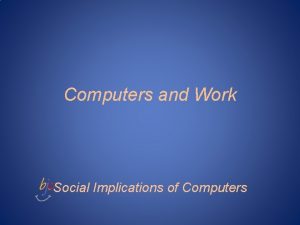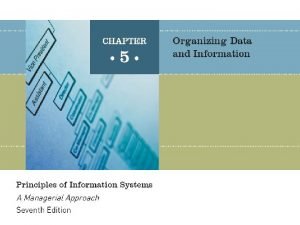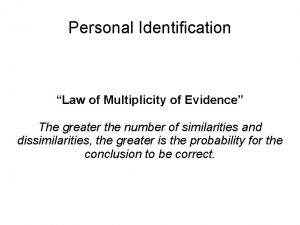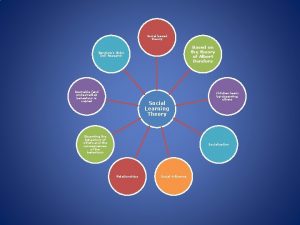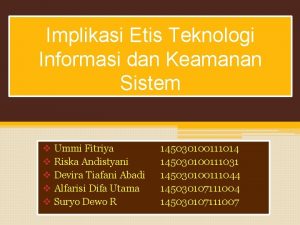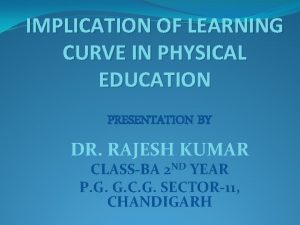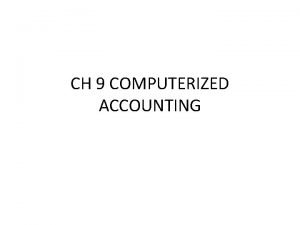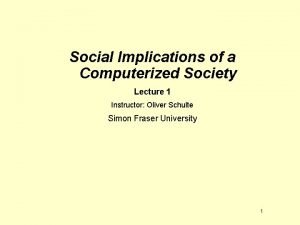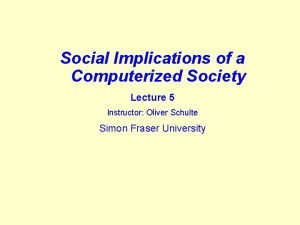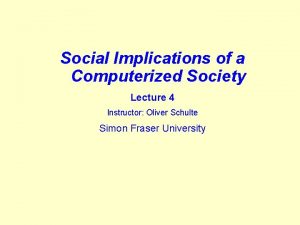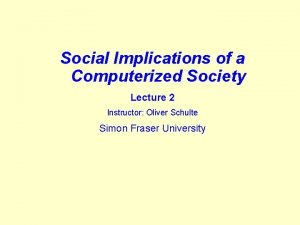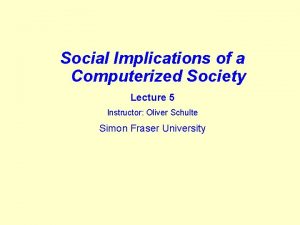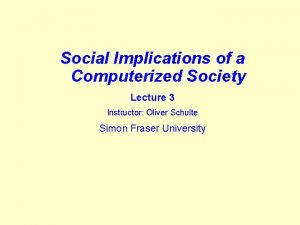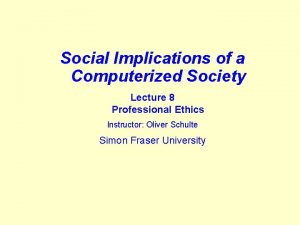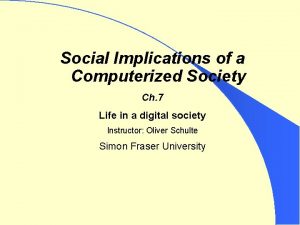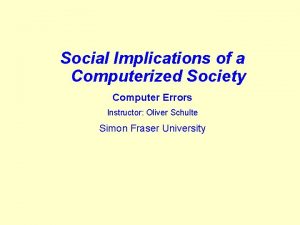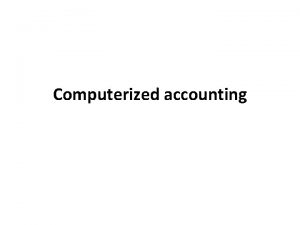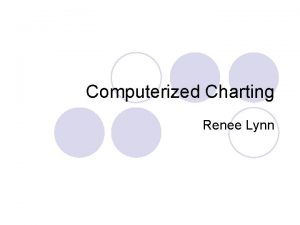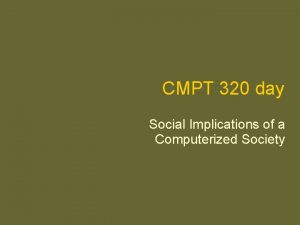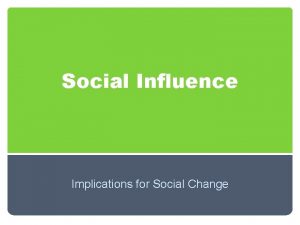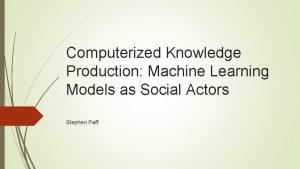Social Implications of a Computerized Society Lecture 1



























- Slides: 27

Social Implications of a Computerized Society Lecture 1 Instructor: Oliver Schulte Simon Fraser University 1

Outline • Benefits and Applications of Computers. • We will talk a lot about problems later. • Key concepts and issues: – Different types of benefits (economic, efficiency, convenience, new personal opportunities, better government) – Do computers make old problems worse? How? – Do computers introduce new problems? – Where can we look for solutions: law, technology, education, the marketplace? – We will come back to ethical concepts later 2

INTRODUCTION 3

1940 s: First computer was built. 1956: First hard-drive disk weighed a ton and stored five megabytes. 1991: Space shuttle had a one-megahertz computer. Ten years later, some automobiles had 100 -megahertz computers. Speeds of several gigahertz are now common. 4

Computers are everywhere • • • taking and sharing pictures downloading music and watching videos checking email and playing games banking and managing investments finding maps The most important technological discovery of the last few decades is that computers can be used for many purposes other than calculation. (Leslie Valiant) 5

The Good and the Bad: Questions for the Class 1. How many believe computers are increasing unemployment in Canadian society? 2. How many believe computers databases are a serious threat to personal privacy? Any ones in particular? 6

Group Discussion Questions 1. Do you think computers in the future will understand language? 2. Do you believe computers will eventually really think? 3. What is your favourite computer application/use? 4. What application not yet existing would you like to see most in the future? 5. What for you is the worst aspect of computers? 7

Examples IMPACT OF NEW TECHNOLOGY 8

Some Positive Impacts of New Technology: • • • Convenience Efficiency Reliability: decrease error rates New types of jobs. Infrastructure: More options for communication, transactions. 9

Negative Impacts of New Technology • • • Job Losses Abuse by bad actors (criminals) Detrimental to health (physical and mental) Complexity more errors Concentration of power Externalities (e. g. environment) externality = side effect on non-users 10

Cell Phones: Benefits • Relatively few in 1990 s. Approximately five billion worldwide in 2011. • Used for conversations and messaging, but also for: • taking and sharing pictures • downloading music and watching videos • checking email and playing games • banking and managing investments • finding maps, routes • What is your favourite use? 11

Cell Phones: Problems • Location tracking raises privacy concerns. • Cameras in cell phones affect privacy in public and nonpublic places. • Cell phones can interfere with quiet and concentration. • Talking on cell phones while driving is dangerous. • Other unanticipated negative applications: • terrorists detonating bombs • rioters organizing looting parties. • “While all this razzle-dazzle connects us electronically, it disconnects us from each other, having us “interfacing” more with computers and TV screens than looking in the face of our fellow human beings. Is this progress? ” Jim Hightower, radio commentator, 1995 • What is your biggest concern? 12

Social Networks • First online social networking site was www. classmates. com in 1995. • Founded in 2003, Myspace had roughly 100 million member profiles by 2006. • largest social network site from 2005 -2009. • Facebook was started at Harvard as an online version of student directories • Social networking is popular with hundreds of millions of people 13

Social Networks: Benefits • • • Easily share part of our lives. Businesses connect with customers. Organizations seek donations. Groups organize volunteers. Protesters organize demonstrations and revolutions. • Individuals pool resources through “crowd funding”. • What is your favourite use? 14

Social Networks: Problems • • • Stalkers and bullies stalk and bully. Jurors tweet about court cases during trials. Socialbots simulate humans. Misinformation hurts democratic debate Facebook use correlates with depression What is your biggest concern? 15

The Internet and Communication • In the 1980 s, email messages were short and contained only text. • People worldwide still use email, but texting, tweeting , and other social media are now preferred. • Creating and sharing videos is possible at a huge scale –the Youtube culture 16

Internet Communication: Benefits • Non-invasive; read at recipient’s convenience. • Saves time • Free Access to vast amounts of information - empowerment. • including user fora, Craigslist • • Much information on WWW is free. Public fora not limited to geographic boundaries. More independence. More options for communicating. “Many-to-many” medium; TV/radio are “one-to-many”. 17

Internet Communication: Problems • • • Contributes to Alienation, Isolation (? ) Hacking, Computer Crime Scale back of customer service Enables piracy, violation of copyright Facilitates government surveillance (Edward Snowden) • Your biggest concern? 18

Medical Computing • Software controls pacemakers that sense abnormal heartbeat and give a low-voltage shock to the heart. • MRI imaging, CT scans for diagnosis. • Joystick surgery: software filters out shaky movements by physician. • Telemedicine: Remote performance of medical exams and procedures, including surgery. • Record keeping: quick access to your record in the hospital. 19

Benefits Computers Bring to Medicine • • Sophisticated imaging. Reduced surgery time. Training surgeons. Patient monitoring. Improved treatments. Fewer errors. Faster paperwork (reports, referrals, records) But also more paperwork? Q: How does your doctor make use of computers? Would you be use a computerized diagnosis system? Instead of a doctor? 20

E-Commerce • Amazon. com started in 1994 selling books on the Web. It has grown to be one of the most popular, reliable, and user-friendly commercial sites. • e. Bay. com facilitates online auctions. • Traditional brick-and-mortar business have established Web sites. • Online sales in the United States now total hundreds of billions of dollars a year. 21

E-Commerce: Benefits • Sellers can sell directly to buyers • • larger choice, lower prices A new type of economy: Peer-to-peer • Convenience • Your favourite use? 22

E-Commerce: Problems Trust concerns: • People were reluctant to provide credit card information to make online purchases. • Solutions: • • Pay. Pal. com grew out of need for trusted intermediary to handle payments. Encryption and secure servers made payments safer. The Better Business Bureau established a Web site to help consumers see if others have complained about a business. Auction sites implemented rating systems. 23

Benefits of Computers in Reducing Paper Use and Garbage • Send/receive digital documents instead of hardcopy. • Read, write, and edit online. • Cost-saving; smaller storage needed. • Creation of toxic wastes at paper mills reduced. Q: Have computers reduced paper use in your school or workplace? 24

CHALLENGES AND SOLUTIONS 25

Themes of Technology Challenges • Old problems in a new context: crime, pornography • Adapting to new technology: thinking in a new way • Global reach of Net: ease of communication with distant countries • Problem/solution cycle: natural part of change and life 26

Themes of Solutions • Trade-offs and controversy: Increasing security means reducing convenience. • Perfection is a direction, not an option. • • SWOT analysis aims to be more comprehensive Positive + negative view = realistic view • Different criteria for personal choices, business policies, and law. • A variety of sources: • • Technology. Law. Education. The market. 27
 Legal implications of social media
Legal implications of social media Social implications of computers
Social implications of computers 01:640:244 lecture notes - lecture 15: plat, idah, farad
01:640:244 lecture notes - lecture 15: plat, idah, farad Gertler econ
Gertler econ Apa itu social thinking
Apa itu social thinking Social thinking social influence social relations
Social thinking social influence social relations Implications of database approach
Implications of database approach Constructivism
Constructivism Implications table
Implications table Nursing implications for synthroid
Nursing implications for synthroid Father of personal identification?
Father of personal identification? How audience negotiate meaning in mil
How audience negotiate meaning in mil Marketing implications
Marketing implications What is tautology in math
What is tautology in math Example of proposition in math
Example of proposition in math Essentialism and perennialism
Essentialism and perennialism Consumer behavior cengage
Consumer behavior cengage Nursing implications
Nursing implications Bandura social learning theory 1971
Bandura social learning theory 1971 Implications of nativist theory
Implications of nativist theory Implications of nativist theory
Implications of nativist theory Implikasi etis
Implikasi etis Educational implications of learning curve
Educational implications of learning curve Multiverse (entangled)
Multiverse (entangled) Legal implications of nursing documentation
Legal implications of nursing documentation Ranexa nursing implications
Ranexa nursing implications Humulin r nursing implications
Humulin r nursing implications Pavlov theory of learning
Pavlov theory of learning

